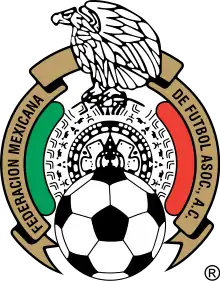Mexican Football Federation
The Mexican Football Federation (Femexfut or FMF, Spanish: Federación Mexicana de Fútbol Asociación, A.C.) is the governing body of association football in Mexico. It administers the Mexico national team, the Liga MX and all affiliated amateur sectors, and controls promoting, organizing, directing, expanding, and supervising competitive football in Mexico.
| CONCACAF | |
|---|---|
 | |
| Founded | 23 August 1922 |
| FIFA affiliation | 1929 |
| CONCACAF affiliation | 1961[1] |
| President | Yon de Luisa |
| Website | fmf.mx |
.jpg.webp)
The Federación has three operational centres: the Central Office, the High Performance Centre (Centro de Alto Rendimiento, CAR) and the Training Centre (Centro de Capacitación, CECAP).
FEMEXFUT is a member of the CONCACAF and FIFA, and is subject to policies, statutes, objectives and ideals of those international play football governing bodies.
The Federación was established on 23 August 1922 under the inaugural president Humberto Garza Ramos. In 1929, FIFA affiliation was established; CONCACAF affiliation was established in 1961.
Structure

The governing body of the Federación is the General Assembly that conforms with the participation of the Liga MX with 55% of the votes; Ascenso MX with 5%; Liga Premier, with 18%; Tercera División, with 13%, and the Amateur sector, with 9%. The executive and administrative body is the National Council, which comprises five members, one from each of the divisions mentioned, and are elected every four years.[2]
Competitions
The league is composed of four professional divisions: Liga MX, Ascenso MX, Liga Premier, and Tercera División. The Liga MX Femenil is the top-tier of women's football in Mexico.
Criticism
Multi-team ownership issue
The issue of multi-team ownership has been a highly debated one within the owners of the professional football clubs and the Femexfut. Of 34 clubs in the top two tiers, about half of the teams are owned by five groups: Grupo Pachuca (León, Pachuca, Mineros de Zacatecas, Tlaxcala), Grupo Salinas (Atlas, Monarcas Morelia), Grupo Caliente (Tijuana, Dorados de Sinaloa, Cafetaleros de Tapachula) and Orlegi Deportes (Santos Laguna, Tampico Madero). Of those groups that own more than one team, that ownership is usually split between the top two tiers of the league and act as a form of player development.[3]
In May 2013, the Liga MX club owners approved banning a person or company from owning more than one team. The issue came to fore when rumor was that Carlos Slim, whose telecommunications company América Móvil owns a 30% stake in Grupo Pachuca,[4] sought to acquire Guadalajara; he would refute the speculation. The ban applied to future acquisitions, not the then current team ownership, and did not require the sale of teams in excess of the one team limitation.[5]
The issue reemerged in November 2013 when TV Azteca, owner of Monarcas Morelia, paid out 124 shareholders of Club Atlas US$50 million to acquire the club, which for years had been struggling financially.[6]
2026 World Cup Bid
In September 2012, former Federación President Justino Compeán confirmed plans to bid.[7] On March 4, 2016, Federación President Decio De Maria announced continued interest after the new FIFA president Gianni Infantino was elected in the wake of the Garcia Report corruption scandal.[8] In April 2017, the Federación, with Canada Soccer Association and the United States Soccer Federation, announced a joint bid to host the World Cup. It was awarded on June 13, 2018; 134 votes versus the Morocco bid by the Royal Moroccan Football Federation with 65 votes. Mexico will host 10 matches, Canada 3 matches, and the United States 60 matches in 10 cities including the final. The shortlist of match cities will be selected by June 2020.
Homophobia
Mexican football fans are known for shouting out "Puto!" (a homophobic slur), when the opposing team's goalkeeper is about to perform a goalkick, a custom that has repeatedly led to FIFA fining the Mexican Federation.[9] In September 2019, the FMF launched a campaign to end the chant during matches,[10] with Federation President Yon De Luisa and Liga MX President Enrique Bonilla announcing new league-wide protocols. The measures will allow officials to stop a match if the homophobic slur is chanted and play an announcement over the stadium loudspeakers as a warning to fans. In case of a second incident during a match, officials will have the option to order the teams back to their changing rooms for a period of 5 to 10 minutes. If the chant continues a third time, the local club will be sanctioned.[11]
The protocols were employed for the first time in the Liga MX on 26 October 2019 during the Apertura match between Atlas and visiting side Necaxa, in which the slur was heard up to six times. Referee Fernando Guerrero eventually ended the match before the completion of the six minutes of stoppage time.[12] The protocols were used for the first time in the playoffs on 27 November, during the first-leg of the series between Club León and Monarcas Morelia.[13]
See also
References
- "Ramón Coll, electo Presidente de la Confederación de Futbol de América del Norte, América Central y el Caribe". La Nación (Google News Archive). 23 September 1961.
- "Introduccion, femexfut" [femexfut introducción] (in Spanish). Femexfut. Retrieved November 10, 2010.
- Marshal, Tom. "Multi-club ownership causing headaches". Yahoo! Sports. Retrieved 7 February 2014.
- Harrison, Crayton. "Billionaire Slim Buys 30% Stakes In Mexico Soccer Teams". Bloomberg. Archived from the original on 22 February 2014. Retrieved 31 August 2012.
- "Mexican club owners move against multi-team ownership". Goal.com. Retrieved 22 May 2013.
- "Multi-Ownership Is Back; TV Azteca Buys Atlas". soccerly. Archived from the original on 25 March 2014. Retrieved 25 November 2013.
- "Mexico to bid for 2026 World Cup". ESPN, Press Association. 21 September 2012. Retrieved 9 February 2013.
- "Mexico wants to host 2026 World Cup as first nation to stage three editions". ESPN, Press Association. 4 March 2016. Retrieved 9 March 2016.
- "FIFA investiga a hinchas mexicanos por conducta inapropiada en el Mundial".
- "Mexico cracks down on homophobic slurs in football". Business Times. September 21, 2019. Retrieved September 23, 2019.
- "protocolo para erradicar el grito homofóbico en Liga MX". Diario AS. Retrieved 24 September 2019.
- "Se suspende primer partido de Liga MX por grito homofóbico". ESPN Deportes. Retrieved 26 October 2019.
- "¡Histórico! Grito homofóbico detiene el primer partido de Liguilla". Fox Sports. Retrieved 27 November 2019.
External links
- Official website
- Mexico at FIFA website
- Mexico at CONCACAF site
